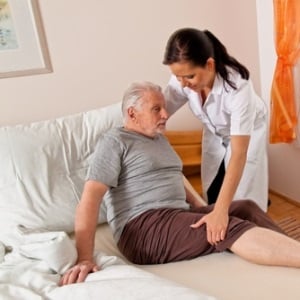
Most caregivers will do practically anything for a loved one with Alzheimer's disease. They'll give baths, help to dress the person, cut up food into manageable bites, and patiently answer the same question 20 times in a row.
But when a patient starts wetting or soiling himself, even the most dedicated caregivers can feel defeated. It's hard to face the prospect of constantly cleaning urine stains from the couch cushions or changing the sheets three times a night. Such accidents, in fact, drive some dedicated caregivers to look for nursing homes.
It doesn't necessarily have to be that way. Sometimes, with a few simple steps, you may be able to help your loved one regain control, or at least more comfort, while saving yourself some work and distress.
Read: Over half of seniors are affected by incontinence
How to keep it under control
The first thing you should do is discuss the problem with the patient's doctor. Incontinence - especially urinary incontinence - is a very common condition among older people, and it may have nothing to do with Alzheimer's.
For instance, many older people have overactive bladders, which leads to a sudden and urgent need to urinate and causes frequent leaking. Others have trouble squeezing urine from the bladder, so the bladder overfills and produces a more or less constant dribble of urine. Due to weak pelvic muscles, many older women lose urine when they sneeze, laugh, or exert themselves. A person with bowel incontinence may be suffering from an infection, diarrhoea, constipation, or a faecal impaction (an accumulation of waste lodged in the bowel).
Many of these problems are reversible. A doctor can prescribe medications to improve bladder and bowel control in some cases. For instance, several drugs are available to calm an overactive bladder, and a number of medications can help people empty a bladder that is overfull.
As the brain damage done by Alzheimer's progresses, you may need to take extra steps to prevent accidents. A confused person can forget to go to the bathroom, or they may not remember what to do once he gets there. You can help by taking your loved one to the bathroom every few hours and, if necessary, showing them the toilet. You should also watch for restlessness, such as tugging at clothes, crossing legs tightly or other subtle clues that they may need to relieve himself.
If the person you are caring for continues to have accidents, do your best to keep them comfortable. To prevent sores, wash the skin thoroughly and apply powder to keep it dry. "Adult briefs" or absorbent pads can be extremely useful in preventing accidents. They may be more accepting of pads if they can pull underwear over them, or if they are built into the briefs themselves. (If your loved one suffers from faecal incontinence, they probably needs to wear adult briefs.)
Most of all, never scold a person for accidents. As painful as this is for you, your loved one isn't trying to make your life difficult. Rest assured, they dearly wish they could take care of themselves.
Here are some other tips that will help keep accidents and frustration at a minimum:
- If your loved one has trouble finding the bathroom in the early stages, put up clear signs with words and pictures.
- If walking is a struggle, buy a portable commode to shorten the trip. A commode next to the bed can be especially useful for preventing nighttime accidents.
- If a person often wets the bed, limit her fluids before bedtime. In later stages, use adult briefs and put a plastic cover under the sheets.
- Make sure a person has plenty to drink during the day. Without enough liquids, a person can become constipated and dehydrated.
- Provide clothes such as sweatpants, which are easy to take off quickly.
- Have grab bars or hand-rails installed next to the toilet, and raise the toilet seat if possible. As the disease progresses, your loved one may lose the muscle strength to sit down and get up easily by herself.
- Give the loved plenty of time to relieve themselves (their body may not send the correct signals right away).
- Help them wipe (always front to back) and flush.
- Plan ahead for bathroom stops if you take a person with Alzheimer's on an outing. Take a change of clothing along just in case.
- If patterns of urination change dramatically, have the person evaluated for a possible urinary tract infection.
- If the person with Alzheimer's has diarrhoea, consult with your doctor; the condition often needs to be treated aggressively.
If an exhausted, overstressed caregiver mistakes a urinary accident for a deliberate act, he or she may in rare instances lose control. If you ever find yourself becoming abusive or yelling after your loved one has an accident, seek counselling help and/or respite care immediately. You don't want to take out your anger on a bewildered, demented person, and your reaction is a sign that you need more help caring for them.
Read more:
Urinary incontinence in menopause
Genes play a role in urinary incontinence
FDA approves botox to treat leaky bladder
Image: A nurse in aged care for the elderly in nursing homes from Shutterstock




 Publications
Publications
 Partners
Partners










